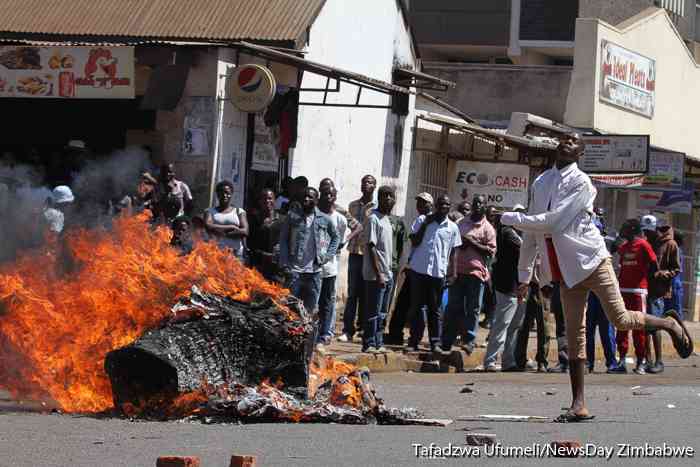
VIOLENCE and political instability have escalated in Zimbabwe since 2017, when an army-backed coup helped President Emmerson Mnangagwa to dramatically ascend to power, a global report said this week.
In its 2023 Global Peace Index (GPI) report, the New York-headquartered Institute for Economics and Peace (IEP) warned that Zimbabwe may further drop on global peace rankings unless authorities stem violence during next month’s general elections. IEP said there had been marked deterioration in Zimbabwe’s “perceptions of criminality and violent demonstrations indicators” this year.
Zimbabwe was ranked 124th, out of 163 countries and independent territories included in the report.
“We can point out that since 2017, Zimbabwe has fallen nine places on the GPI, with large deteriorations on the political instability and violent demonstrations indicators,” Steve Killelea, executive director at IEP, said at the GPI’s launch.
The GPI, which covers 99,7% of the world population, presents a data-driven analysis of peace, its economic value, trends and proffers insights into how economies can develop peaceful societies.
It uses 23 qualitative and quantitative indicators to compile the index, tracking such factors as conflicts, safety and security and the militarisation of political landscapes.
The organisation leverages its wide network of offices in Sydney, Brussels, New York, The Hague, Mexico City and Harare.
“It should be noted though, that IEP does not have comparable data back to 1980 to make a fair comparison,” Killelea said. “Over the past year, the country recorded improvements on the armed services personnel rate and the UN (United Nations) peacekeeping funding indicators, but recorded deteriorations on the perceptions of criminality and violent demonstrations indicators.”
- Mavhunga puts DeMbare into Chibuku quarterfinals
- Bulls to charge into Zimbabwe gold stocks
- Ndiraya concerned as goals dry up
- Letters: How solar power is transforming African farms
Keep Reading
IEP’s report was released days before Zimbabwe’s main opposition party, Citizens Coalition for Change (CCC) said on Wednesday there had been waves of violence and abductions against its supporters by suspected ruling Zanu PF activists, only a month before Zimbabwe holds elections on August 23.
The CCC said cases of violence had been recorded in several constituencies, particularly in Manicaland province.
In an interview with NewsDay this week, CCC Manicaland provincial spokesperson David Panganai confirmed the reports.
“We are still recording several cases and abductions in the Manicaland province. We have a case of violence against our supporter Kingstone Marekera in Dangamvura by Zanu PF supporters, that is, in Dangamvura constituency,” Panganai said.
In its report, IEP said next month’s polls would be crucial for Zimbabwe’s performance in the next GPI.
“Political instability is one of the 23 indicators in the GPI. If the elections run smoothly, it should have no impact on Zimbabwe’s score. However, if the elections are contested or are otherwise disrupted, this could lead to deterioration on the political instability indicator,” IEP said this week.
It warned that countries going through economic turbulences were at risk of falling into violent conflict.
“In general, any society facing high levels of economic turmoil is at risk of falling into conflict than a country with a stable economic environment,” Killelea said.
“Of all the countries in the Sadc (Southern African Development Community), Zimbabwe has the third lowest level of peacefulness, with only South Africa and DRC (Democratic Republic of Congo) having lower levels of peacefulness.”
The DRC has been ravaged by prolonged conflict in its eastern provinces.
Quoting a UN report, Save the Children said in a document released on June 27, the DRC “had the highest number of grave violations against children in armed conflict in the world for a second year in a row in 2022, with at least 2 420 children suffering from violations such as killing, maiming, abductions, and sexual violence”.
However, Killelea noted that there had been improvements in the momentum of the Zimbabwean governance system regarding its effectiveness and government accountability over the past decade.
“If this momentum is preserved, Zimbabwe may reach levels of effectiveness in these indicators on par with its sub-Saharan African neighbours,” he said.
Killelea also applauded Zimbabwe for avoiding external conflicts.
“Although Zimbabwe has issues internally, it is not involved in any external conflict as of 2022. Most other countries in the Sadc region are involved in at least one external conflict. Only Mozambique, Zimbabwe, and Namibia had not been involved in an external conflict in the past five years.”
Meanwhile, among key results from the report, deaths from external conflict recorded a sharp deterioration driven by the Russian invasion of Ukraine.
“Despite recent commitments, militarisation has improved in 113 countries since 2008. Terrorism continued to improve, with 70 countries recording no attacks in 2021. This is the best result since 2008,” the GPI report states. “The rise in costs has increased food insecurity and political instability globally, with Africa, South Asia and the Middle East under threat.”







